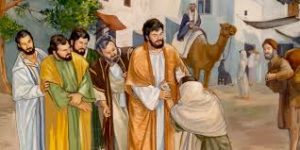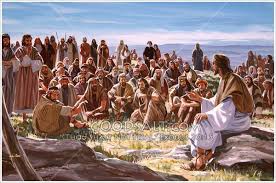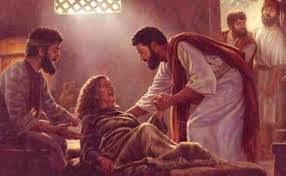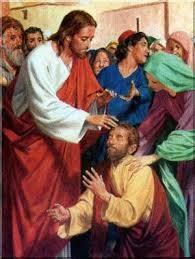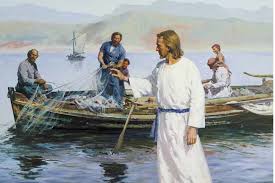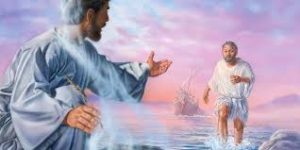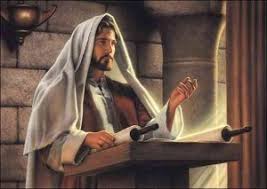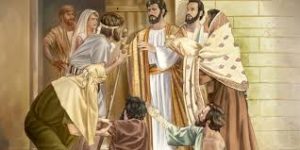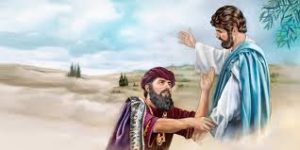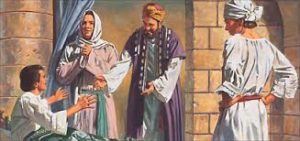Cx – God’s Chosen Servant Matthew 12:15-21 and Mark 3:7-12
God’s Chosen Servant
Matthew 12:15-21 and Mark 3:7-12
God’s chosen Servant DIG: In reacting to the Pharisee’s threats to kill Him, how did the Lord fulfill prophecy? What did that say about Yeshua’s identity? How far were people traveling to see and hear Messiah? Why were the people coming? Did this matter to Yeshua? Why or why not? How many did He heal? Who recognized His true identity?
REFLECT: How does Jesus’ example or courage and conviction in the face of danger inspire you? In telling other people about Christ, what use of the TaNaKh do you make? What is one way the Lord has healed your life? What motivates you to come to Yeshua for help? How far do you have to travel to be with Him?
The Bible attributes many titles to Messiah, and none is more fitting than My Servant, a title first used by Isaiah (see my commentary on Isaiah, to see link click Hp – Here Is My Servant, Whom I Uphold). Just as the prophet predicted the coming of the Meshiach, Yeshua came in wonder and majesty as the divine Servant, serving the Father and mankind.
This brief passage is an island of refreshing beauty in an ocean of confrontation, which records the first major rejection of Christ, led by the Pharisees and the Torah-teachers. The main point of contention was the Oral Law (see Ei – The Oral Law). After the renegade Rabbi exposed their unscriptural beliefs about the Sabbath, the Pharisees went out and began to plot with the Herodians how they might kill Jesus (Mark 3:6). In the midst of that mounting antagonism, however, we learn some outstanding characteristics of our Savior whom the world hates but ADONAI dearly loves.
Aware that the Pharisees plotted to kill Him, Jesus immediately withdrew from that place on the Sabbath. He had not come to do His own will but the will of His Father (John 5:30 and 6:38), and it was not the Father’s time for the Son’s ministry and life to end. Until then Yeshua would be in a continuous cycle of preaching and healing, of acceptance by some but rejection by most (especially the Pharisees) and then withdrawing to another place. As His ministry progressed, like birth pangs, the cycles became shorter and shorter because the opposition came more quickly and more intensely.
He had to leave the synagogues. It was not that He withdrew through fear; it was not the retreat of a Man who feared to face the consequences. When the time came, Jesus accepted His arrest, trial, and crucifixion without complaint or resistance – although at any time He could easily have saved Himself and destroyed those who sought to destroy Him. But, that would be years later. There was much He had to do and say before the time of the final conflict. So, He left the synagogues and went out to the lake and the open sky.
The Lord and His talmidim withdrew to the Sea of Galilee and a large crowd followed Him. There was a rising, stirring interest in Yeshua’s messianic claims. His reputation was spreading, not only within Jewish territory, but also among the Gentiles. When they heard about all He was doing, many people came to Him from Judea, Jerusalem, Idumea, and the regions across the Jordan and around Tyre and Sidon (Matthew 12:15a; Mark 3:7-8). Many made the hundred-mile journey from Yerushalayim to Judea to listen to Him and to be healed by Him. The word large, polu, is in the emphatic position, and calls attention to the fact that it was an exceptionally large crowd.
The people Jesus healed were despised and neglected by the Pharisees and the Torah-teachers, as well as the Sadducees (the priesthood), which ADONAI had established as a means for bringing His people nearer to Himself. The religious leaders were only interested in the rich and influential, not the sick, the poor, or the outcast. As in the case of the man with the shriveled hand (see Cw – Jesus Heals a Man with a Shriveled Hand), their only interest in his affliction was to use it as a means of inducing Messiah to break the Sabbath in order to accuse and convict Him. Jesus, on the other hand, always had time for those who were in need.
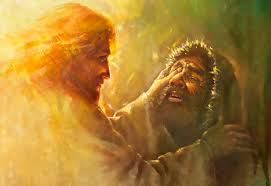
The Lord healed many people who didn’t even believe in Him for salvation, merely desperate for healing. Of the ten lepers He cleansed on one occasion, only one, a Samaritan, showed evidence of faith by returning to give thanks. Messiah’s words: Rise and go, your faith has made you well (Luke 17:19), refer to the man’s spiritual healing through salvation, not to his physical healing from leprosy, which had already taken place. All ten lepers were physically healed, but only one was healed spiritually.
Christ feels the pain that hurts us and the weight of burdens that grind us down; and in His grace He heals our hurts and lifts our burdens. He said: Come to Me, all you who are weary and burdened, and I will give you rest. Take My yoke upon you and learn from Me for I AM gentle and humble in heart, and you will find rest for your souls. For My yoke is easy and My burden light (Mattityahu 11:28-30). The Pharisees, Sadducees and Torah-teachers, who were the false shepherds of Isra’el (Jeremiah 23), had only imposed heavy burdens, but when the true Shepherd came to Isra’el, He lifted them. That is why Peter tells us to cast our burdens and anxieties on the Chief Shepherd, because He cares for you (First Peter 5:4 and 7).475
Because of the crowd He told His apostles to have a small fishing boat, essentially a rowboat, ready for Him, to keep the people from crowding because those with diseases were pushing forward to crush Him (Mark 3:9-10). The verb to crush is epipipto, means to fall upon. Those around Him fell against Him in the desperation to be healed; they seemed to have little interest in Jesus other than a miracle-worker. The scene must have been chaotic. Jesus stayed with the unruly crowd because they needed Him, but, He found it necessary to protect Himself. Therefore, He needed a little rowboat ready, and close to the shore, so as to be able to take Him off at a moments notice. The verb shows continuous action. The rowboat was able to keep moving down the shoreline.
Jesus healed all who were ill. In anticipation of His coming rejection by the Sanhedrin, He warned them not to tell others about Him (Mattityahu 12:15b-16). It is not that the Servant will be completely quiet, yet it was clear that the point was coming quickly where He would stop trying to convince the nation of Israel in general, and the Great Sanhedrin in particular, that He was indeed the Meshiach (see En – Four Drastic Changes in Christ’s Ministry).
Matthew noted that this ministry to those multitudes who had come from outside the land of Israel was a fulfillment of Isaiah 42:1-4. The Gentile nations would turn to Him and put their faith in the blessed hope. This was to fulfill what was spoken through the prophet Isaiah (see my commentary on Isaiah Hp – Here Is My Servant, Whom I Uphold). Isaiah declared: Here is My Servant whom I have chosen, the One I love, in whom I delight. The Greek word pais is not the usual word for servant and is often translated son. In secular Greek it was used of an especially intimate servant who was trusted and loved like a son. In the Septuagint, the Greek translation of the TaNaKh, pais is used of Abraham’s chief servant (Genesis 24:2), of Pharaoh’s royal servants (Genesis 41:10 and 38), and of the angels as ADONAI’s supernatural servants (Job 4:18). I will put My Spirit on Him, and He will proclaim justice to the nations. He will not quarrel or cry out; no one will hear His voice in the streets. A bruised reed He will not break, and a smoldering wick He will not snuff out, till He has brought justice through to victory. In His name the nations will put their hope (Mattityahu 12:17-21).
Those who saw Jesus – really saw Him – knew there was something different. At His touch blind beggars received their sight. At His command crippled legs became strong and walked. At His embrace empty lives were filled with vision.
He fed thousands with one basket. He stilled a storm with one command. He raised the dead with one proclamation. He changed lives with one request. He altered the history of the world with one life, lived in one country, was born in one manger and died on one hill . . .
God did what we wouldn’t dare dream. He did what we couldn’t imagine. He became a man so we could trust Him. He became a sacrifice so we could know Him. And He defeated death so we could follow Him.
It defies logic. It is a divine insanity. A holy incredibility.
Only a Creator beyond the fence of logic could offer such a gift of love.476
While some rabbinic commentators attempt to connect this and other Suffering Servant passages to the nation of Isra’el as a whole (see my commentary on Isaiah Iy – The Death of the Suffering Servant), many other sources disagree by acknowledging that this passage solely applies to the coming Messiah (Targum Yonaton, Rabbi David Kimchi). This rings true, as a close study of the Suffering Servant passages confirm that there are many results only the Meshiach (not national Isra’el) can accomplish (for example, the atonement of sins and faith on the part of the Gentile nations). As an eyewitness to those events in the life of Yeshua, Mattityahu uses the Isaiah proof-text to show that the ministry of Jesus will soon go through the predicted shift in emphasis from national, to individual salvation.477
Some of the people brought friends or relatives who were demon possessed in the hope that Jesus could deliver them. Whenever the impure spirits saw Him, they fell down before Him. The verb is in the imperfect tense, pointing to continuous action. The demons repeatedly threw themselves down before Him. And they cried out, “You are the Son of God” (Mark 3:11). Once again the verb is imperfect. They kept on crying out. All of the deep, throaty, unruly voices from the satanic world must have sounded horrific. The fact that they testified that Yeshua is the Son of God indicates their knowledge and acceptance of the Trinity.
But He gave them strict orders not to tell others about Him (Mark 3:12). He would not accept testimony from demons. It is truly ironic that the demons recognized Jesus as the Son of God even though the large crowd and the Jewish religious leaders did not.
A good mystery novel provides intriguing details that twist and intertwine until the reader is almost in knots. That’s the point at which a good storyteller pauses; rather than adding more details, the detective in the story sits down to mull over the evidence This gives the readers a chance to collect their thoughts – to assimilate what is known and to prepare for new details to come.
Mark, the master storyteller, has paused at this point to give us time for reflection. In previous chapters, we’ve seen Jesus healing people afflicted with one sickness after another. Messiah went out and recruited His first apostles, but soon, crowds of people were coming to Him. There was that intriguing little secret that slipped out when Yeshua exorcised demons. They knew who He was, but the Son of God would not let them speak (Mark 1:23-26). Mark had captured the attention of his readers.
Interest was not enough in itself; however, for Mark also had a message to get across. He established a couple of general points about the Meshiach before proceeding with any more details or stories.
First, Jesus had an overwhelming appeal. If you mark on a map the cities and regions from which people were coming (Mark 3:8), you would see that crowds were streaming in from all directions to listen to the Rabbi from Galilee. He wasn’t merely some local rabbi with a small following of talmidim. He attracted great numbers of people from every region and from every walk of life.
Second, Everyone had to decide for themselves – Who is this man? What is so special about Him that the demons are not permitted to announce His identity? Mark would continue to give us clues, but the question he wanted his audience to ponder at this point, and throughout his Gospel, was, “Who is Jesus?”
Let us take time today for the reflection that Mark intended. If you’re not completely convinced of the greatness and divinity of Jesus of Nazareth, take time today to pray about the evidence in the Life of Christ. Those who are committed believers, take some time to allow the Ruach Ha’Kodesh to speak to you more deeply. No matter how close you’ve grown to Yeshua, His presence always calls for change and renewal. Like leaky vessels, we constantly need to be refilled with the living water of the Spirit.478
Lord Yeshua, I open my heart for You to speak to me. Whether You’re calling for change in my personal life, or calling me to service in my family, church, messianic synagogue, community or nation, I want to follow wherever You go. Amen.



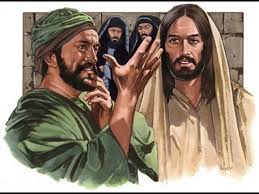
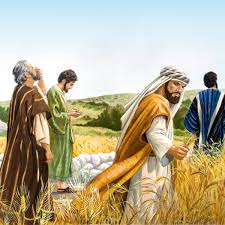
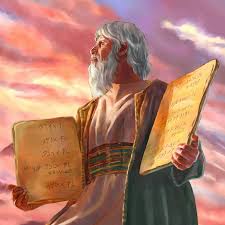
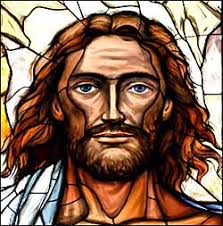
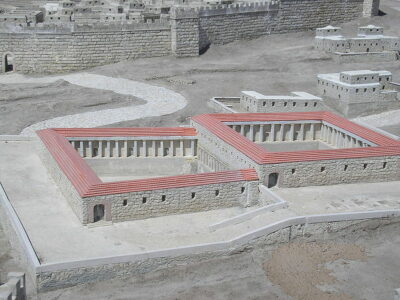
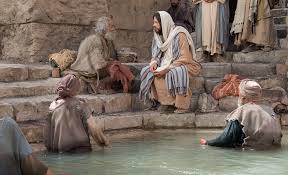
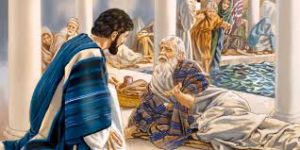
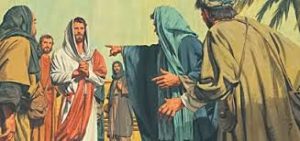
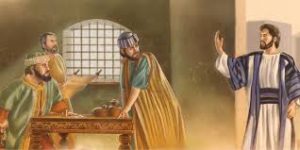
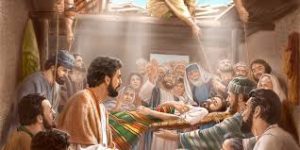
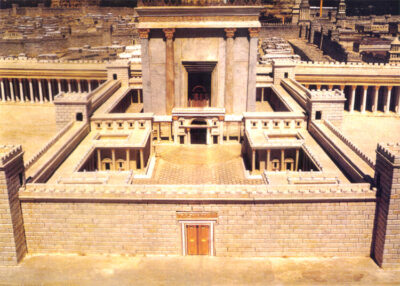 They must have wondered why, and eventually the rabbis came up with an explanation (as they always did).
They must have wondered why, and eventually the rabbis came up with an explanation (as they always did). 